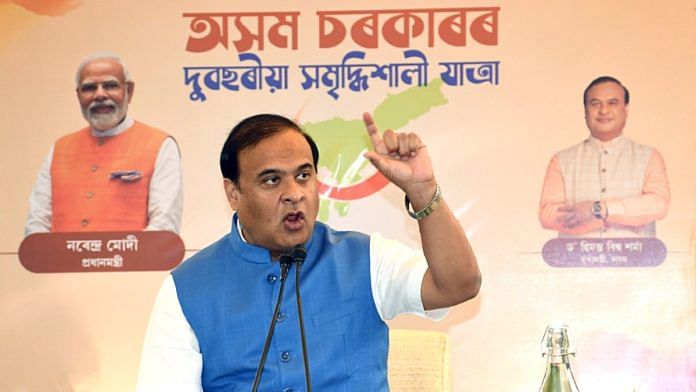New Delhi: Assam Chief Minister Himanta Biswa Sarma has said that his government would move ahead with its plan to end polygamy in the state, irrespective of the religion or caste of those engaging in the practice. Hours after a four-member expert committee submitted its report on the state’s competence to frame laws on polygamy, Sarma said Sunday that a bill on this subject would be introduced in the assembly in the current financial year.
The chief minister had constituted the expert committee headed by Justice (Retd) Rumi Kumari Phukan on 12 May to scrutinise the Muslim Personal Law (Shariat) Application Act, 1937, in addition to Article 25 of the Constitution — the freedom of conscience and free profession, practice and propagation of religion — in relation to the Directive Principles of State Policy for the Uniform Civil Code (UCC).
According to a report by The Times of India, the expert committee has opined that the state government “has the legislative competence” to frame laws to end polygamy, but it would need the President’s assent.
The committee, Sarma said, “highlighted the absence of age specifications” in Muslim personal law, adding that the state government can introduce a state law with “provisions similar to those in the POCSO Act” to “resolve incongruences” with the law as it exists today.
While the Indian Penal Code (IPC) criminalises bigamy under section 494, polygamy continues to be practiced across communities. ThePrint explains the legality of polygamy and what data reveals about its prevalence in India.
Also Read: Raising marriageable age for women, ban on polygamy — what’s in Uttarakhand’s draft UCC
Legality of polygamy
Under section 494 of the IPC, if any person marries someone while having a husband or wife from an already existing marriage, he or she shall be punished with imprisonment of up to seven years, and a fine.
In such cases, an FIR can be registered with the consent of the first spouse. If the spouse is an aggrieved female, a complaint can also be lodged by her father under section 494.
To prove the offence of bigamy, direct evidence, such as a photograph of the second marriage, a marriage certificate or the testimony of the priest who solemnised the second marriage is needed to demonstrate that the second marriage was contracted during the subsistence of the first one.
A second marriage while the first one exists would be considered void under the Hindu Marriage Act (HMA). There are, however, exceptions, such as if a spouse has been invisible from the person’s life for more than seven years and has thus been presumed dead.
Muslims are the only community allowed topractice polygamy legally, under section 2 of the Muslim Personal Law (Shariat) Application Act, 1937. The only condition is that all parties entering a polygamous relationship should be Muslim. This section is under challenge before the Supreme Court.
There are eight petitions pending in the top court wherein petitioners have pleaded to the court to declare the practice of polygamy and “Nikah Halala” unconstitutional and illegal. In September 2022, the apex court set-up a five-judge bench to look into the issue.
It has been argued in the petitions that the practice of polygamy is violative of the rights guaranteed by Article 14 and 15 to women and that it is discriminatory on the basis of gender.
According to a 2018 report by the Law Commission, the majority of cases of polygyny in India are without the consent of the wife of the man partaking in it. The Law Commission felt this was violative of the marital rights of the wife.
Polygyny refers to the practice of a man having more than one wife.
At present, Goa is the only state in India to have a UCC in the form of a common family law. The Portuguese Civil Code, which was introduced in the 19th century still prevails in the state. Under the UCC in Goa, there is a strict requirement to register every birth, marriage, divorce, death, etc. Muslim men who have their marriages registered in Goa are also subjected to the UCC and are not allowed to partake in polygamy or bigamy.
Data on polygamy in India
According to the National Family Health Survey (NFHS-5), 1.4 percent of married Indian women in the period 2019-2021 said their husbands had another wife or wives. Data also pointed to a higher rate of polygamy among the Scheduled Tribes (2.4 percent) and marginally among the Scheduled Castes (1.5 percent).
At 1.6 percent, Meghalaya reported the highest figure for polygamy among any state, while Goa was at the bottom of this list with a figure of 0.2 percent.
Its prevalence among different religions, on the other hand, is 2.1 percent among Christians, 1.9 percent among Muslims, 1.3 percent among Hindus and Buddhists, 0.5 percent among Sikhs and 2.5 percent in the case of other religions or castes.
In 2019-21, polygamous marriages in the country declined among Muslims and Hindus, and witnessed a marginal surge among Sikhs, compared to the previous NFHS survey (2015-16).
According to NFHS-5 data, the percentage of Muslim women who said their husbands had more than one wife stood at 1.9 percent. This number was 1.3 percent in the case of Hindu women.
While the Muslim community in India does have a higher national average of polygamous marriages, the rate of polygamy is higher among Hindus than that of Muslims in at least four states, namely Telangana, Chattisgarh, Tamil Nadu and Andhra Pradesh.
(Edited by Amrtansh Arora)
Also Read: Muslim clergy staunchly oppose UCC, but women’s organisations see chance to get ‘gender-just laws’



